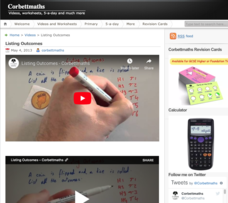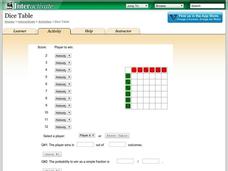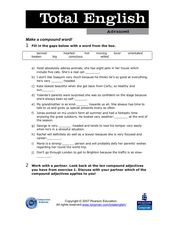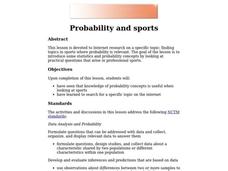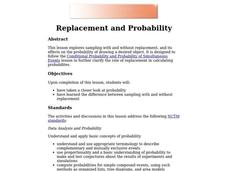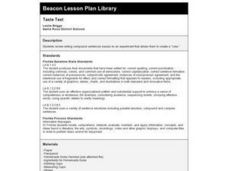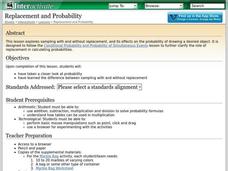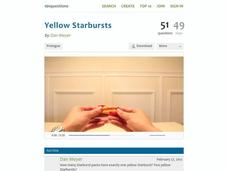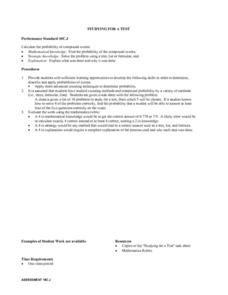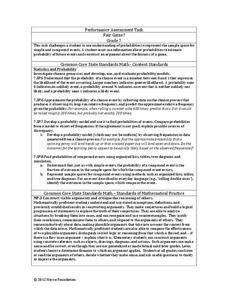Curated OER
Games for Probability: In-Class and Powerball Simulation
Your soon-to-be statisticians play a game to understand the difference between independent and dependent experiments and probability. They draw colored cubes from a bag and then, by either replacing the cube in the bag, or not, for each...
Achieve
False Positives
The test may say you have cancer, but sometimes the test is wrong. The provided task asks learners to analyze cancer statistics for a fictitious town. Given the rate of false positives, they interpret the meaning of this value in the...
Corbett Maths
Listing Outcomes
Make a list and check it twice. Many times, it is beneficial to make a list of the possible outcomes when trying to determine a probability. The resource shows how to systematically make a list and then calculate the probability of...
Mathematics Assessment Project
Lottery
A probability activity presents a lottery game as an idea for a fundraiser. Pupils analyze the game to determine the number of possible outcomes, then determine whether the game would be a good way to raise funds and to support their...
Project Maths
Outcomes of Coin Tosses
Flip a coin: heads, use the resource; tails, use the resource. The fourth of six installments of the Statistics & Probability unit looks at coin tosses and probability. The class conducts an experiment and sees that the outcomes of...
Shodor Education Foundation
Dice Table
Convert a table to probabilities. Pupils set up the winning rules for the sums of two dice. Using the rules, the applet fills out a table showing the winners for each combination. Learners determine the probabilities of winning for each...
Mathematics Assessment Project
Memory Game
Middle schoolers must determine probabilities for a memory game in which winning requires matching two of the same cards. They then must determine what happens when more cards are added to the pile.
Bowland
Lottery
Take a chance on raising money. Learners calculate probabilities to determine whether a lottery is a good way to raise money. Pupils determine the number of combinations of choosing two numbers between one and six. Using the sample...
Curated OER
Fire!, Probability, and Chaos
Students explore the concept of probability. In this probability lesson, students simulate a controlled forest burn using an applet. Students vary the probability of trees burning and predict what will happen.
Curated OER
Total English Advanced: Make a Compound Word!
In this compound words practice instructional activity, students examine the 10 sentences that are missing part of a compound word. Students fill in the blanks with the appropriate words from the word bank.
Curated OER
Probability and Sports
Students research topics on the internet where probability is relevant. Students study statistics and probability concepts by looking at practical questions that arise in professional sports.
Curated OER
From Probability to Combinatorics and Number Theory
Learners see how division is used to help solve probability problems. They use tables as data structures where they are used to count outcomes and to compute probabilities. Students use games to help solve probability problems.
Curated OER
Replacement and Probability
Students explore sampling with and without replacement. They explore the effects on the probability of drawing a desired object. Students examine probability and the difference between sampling with and without replacement.
Curated OER
Probability and Statistics - Week 10
In this probability and statistics worksheet, students find compound dependent and independent probability of given situations. They identify the mean, mode, range and median of sets. This two-page worksheet contains explanations,...
Curated OER
Taste Test - Combining Sentences
Students combine sentences to create compound sentences. They write about creating their own soda, then make their own soda, comparing and contrasting it with a national brand. They write a paragraph containing compound sentences.
Curated OER
Probability: Basic Rules of Probability
In this probability worksheet, students determine the probability of independent and dependent events. They complete simple and compound events. This four-page worksheet contains five problems. Answers are provided.
Curated OER
Sequences, Series, and Probability
Students will find the finding n terms of a sequence, and partial sums with and without using a graphing utility. Students will apply properties of sequences, series, and probability to word problems such as salary calculations, seating...
Shodor Education Foundation
Introduction to the Concept of Probability
Acquaint mathematicians to the concept of probability with a discussion about the results of a game. Then have them play a dice, card, spinner, or coin game and recording the number of wins vs. the number of tries on an interactive web...
Shodor Education Foundation
Replacement and Probability
Middle and high schoolers explore the concept of probability. In this probability lesson plan, learners conduct an experiment with a bag of marbles. Pupils draw marbles from a bag and determine the probability of drawing a particular...
101 Questions
Yellow Starbursts
Let the task burst your mind. Scholars estimate the frequency that both Starbursts in a pack are yellow out of 287 packs. They apply probability concepts to complete the sweet task.
Curated OER
Studying for a Test
Middle schoolers calculate the probability of compound events. They solve the problem using a tree, list of formulas and explain what was done and why it was done. Students develop the following skills in order to determine, describe...
Worksheet Works
Create a Compound Events Worksheet
Create your own compound events assignment! You choose whether you want the numbers displayed as numerals or words, and if you want problems to include dependent or independent events. You can even designate a challenge level between...
Curated OER
Compound Events: Independent and Dependent
In this probability worksheet, students analyze word problems to determine for part one the independent events and for part two the dependent events. There are 6 questions.
Noyce Foundation
Fair Game?
The game should be fair at all costs. The mini-assessment revolves around the ability to use probabilities to determine whether a game is fair. Individuals determine compound events to calculate simple probabilities and make long-run...
Other popular searches
- Probability Compound Events
- Compound Probability Game
- Sport Compound Probability
- Probability of Compound Events




